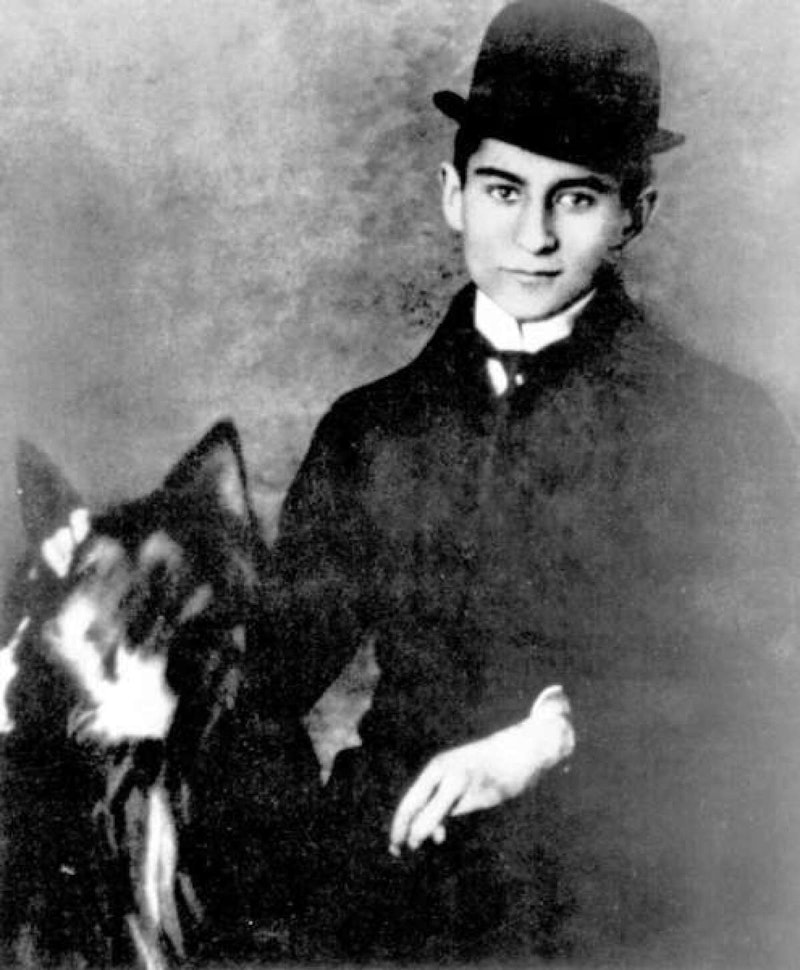Next year will mark the 100th anniversary of Franz Kafka’s death. My introduction to Kafka dates from the early-1980s. I was at home, lying in bed on a sunny afternoon. I turned on the TV to watch channel 45, a small local Baltimore TV station that had as its two hosts Captain Chesapeake and a creature named Mondy The Sea Monster. Normally at the hour they showed The Three Stooges or Laurel and Hardy shorts. That day there was a movie playing that must’ve begun shortly before I tuned in for I missed the opening titles. It was in black and white and had a repetitive and beautifully lugubrious soundtrack. It wasn’t exactly what one might call fun, but it was so odd and so many strange turns that I kept watching. Anthony Perkins was in it and then I saw Orson Welles and Akim Tamiroff show up. The film had an atmosphere that I really liked, a strange non-linear, dream-like feel and very interesting camera work. Finally it ended and Captain Chesapeake and Mondy announced that we’d just watched Welles’ film version of Kafka’s The Trial.
I mentioned to my girlfriend at the time that I liked the movie and wanted to read the book. She was working at the law offices of Stephen L. Miles, a Baltimore lawyer who advertised continually on TV. Anyway, my friend noticed that he had a copy of The Trial sitting in the waiting room, probably as a joke, and that the spine of the book showed it was unread. She brought it home as a present. I thoroughly enjoyed it and became a Kafka initiate.
My next interaction with Kafka took place the first time I visited Paris, in 1984 when I happened to go by the Centre Pompidou. There was a large exhibition of Kafka material, writings, drawings, memorabilia, etc. I didn’t speak French at the time, and I don’t speak German, so the only thing I remember are some scribbles he did and some letters under glass.
By a strange coincidence, 12 years later, when I moved to Paris I learned that the curator of that Kafka exhibition was a family friend of the woman with whom I was to ultimately have a child. I learned she knew the Kafka family and I wound up staying in the Kafka house in Prague and meeting the daughter of Ottla, Kafka’s favorite sister. Her name was Vera, she was around 90 at the time. Meeting her was like coming into contact with a living representative of the historical past, though almost blind and wheelchair-bound, she was like a monument, serene, powerful and tragic.
Kafka’s often presented as an Expressionist figure, a tortured soul wandering about Prague in bureaucratic hell, accompanied by Cabinet of Dr. Caligari-like backdrops. While it’s true that many of his stories have a dark psychological aspect, this vision of Kafka ignores his penchant for slapstick comedy. During the Covid lockdowns in Paris I did a lot of reading. I noticed The Castle, Kafka’s last novel on my shelf and decided to read it again, having only a vague memory of it. It was the right choice. I think it saved me from what could’ve been a very deep state-controlled depression. I liked it so much that I read it twice, in quick succession. It’s a laugh riot, filled with crazy characters and Chaplin-like situations. What else can you say about a book where in the first scene the hero makes love to a barmaid below the counter in a busy Tavern only to discover that she’s the mistress of the man who controls his fate? Or when the job of land-surveyor he has come to fill is found not to exist, they make him the school teacher and set up his lodgings in the main room of school house where he has to move them each time he teaches class? It’s said that Kafka, when reading his books to his friends, would break into fits of laughter. This humor in Kafka, which I have subsequently learned is no secret to German readers of his works, runs throughout his entire work.

